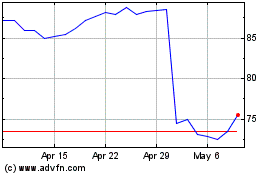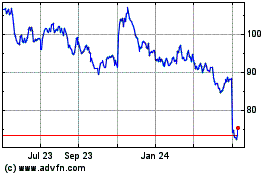Nestlé to Sell Starbucks Coffee, Tea in Retail Stores -- 2nd Update
May 07 2018 - 10:47AM
Dow Jones News
By Brian Blackstone and Julie Jargon
Starbucks Corp. is selling the rights to sell its coffee and tea
in grocery and retail stores to Nestlé SA for more than $7 billion,
as the chain refocuses on its coffee shops.
Sales have been slowing at Starbucks coffee shops in the U.S.
amid declining mall traffic and increased competition from new
rivals. Starbucks has opened higher-end stores under brands called
Roastery and Reserve to cater to customers willing to pay more for
specialty drinks and pastries.
Starbucks also wants to open more coffee shops in China, a
market the Seattle-based company said will eventually overtake the
U.S. as its largest. The company recently opened its first giant
Roastery store in Shanghai.
"Our retail business in the U.S. and China are our two big
growth engines," Starbucks Chief Executive Kevin Johnson told
investors on a call about the deal Monday.
Starbucks shares rose 2.4% to $59.08 in premarket trading
Monday. That's down slightly from $59.77 a year ago. Nestlé shares
were up 0.6% in early trading Monday.
The deal gives Starbucks an upfront infusion of cash that it
plans to return to shareholders through share buybacks. Starbucks
said it planned to give $20 billion to shareholders over three
years in buybacks and dividends. That may assuage some shareholder
concerns as Starbucks works to boost sales growth.
Nestlé said it would pay Starbucks $7.15 billion as well as
continuing royalties on all sales. Mr. Johnson said the partnership
will raise familiarity with the Starbucks brand by getting its
ground and whole bean coffee into international markets where it
isn't currently sold.
Nestlé, meanwhile, hopes more coffee sales can offset flagging
sales of some of its other packaged food businesses. As part of the
Starbucks deal, Nestlé will add Starbucks Reserve, Seattle's Best
Coffee and Teavana to a portfolio that includes Nescafé and
Nespresso brands.
Starbucks' consumer packaged-goods business has annual sales of
nearly $2 billion. The transaction doesn't include any fixed assets
and excludes Starbucks' ready-to-drink products. Starbucks has
partnerships with PepsiCo and Anheuser-Busch to produce, bottle and
distribute its ready-to-drink coffee and Teavana teas. The deal
also doesn't include sales of products at Starbucks coffee shops or
Starbucks K-Cups, the single-serve coffee pods used in Keurig
brewers in North America.
Mr. Johnson said Starbucks is the No. 1 coffee brand on the
Keurig system. "We intend to keep that," he said.
About 500 Starbucks employees will join Nestlé. Starbucks must
approve any new products to be sold under the label.
The deal comes as JAB, a European holding company, has moved
aggressively into the American coffee business. The company
believes the U.S. is poised for breakneck growth as consumers shift
away from soft drinks. JAB sees Nestlé as its main competitor.
The Starbucks deal will bolster Nestlé's reach in the U.S. as
that fight picks up, said Vontobel Research analyst Jean-Philippe
Bertschy.
Nestlé has highlighted coffee as a priority, along with bottled
water, pet care and infant nutrition. Nescafe generates about 10
billion francs ($10 billion) of Nestlé's nearly 90 billion francs
in annual sales. Nespresso's annual sales are more than five
billion francs. Last September, Nestlé bought a majority stake in
specialty U.S. roaster and retailer Blue Bottle Coffee.
Nestlé has been shaking up a product mix that stretches from
DiGiorno frozen pizza and Perrier bottled water to Maggi noodles
and medicinal foods. That has taken on more urgency since American
activist investor Dan Loeb took a big stake in Nestlé.
In addition to the Blue Bottle deal, Nestlé last year bought
California-based Sweet Earth, which makes vegan and vegetarian
products. In June, it bought a minority stake in startup Freshly,
which sells prepared meals directly to U.S. consumers.
In January, Nestlé sold its confectionery business, which
includes the Butterfinger and Baby Ruth brands, to Italian candy
maker Ferrero International SA for $2.8 billion in cash.
Like other large consumer-goods companies, Nestlé has struggled
with competition from local upstarts and a rapid shift in consumer
tastes toward locally grown, organic food. The company has also had
trouble raising its prices.
This isn't the first time Starbucks has outsourced the sale of
its packaged coffee in grocery stores. In 1988 the company agreed
to let Kraft Foods distribute and market Starbucks brand coffee in
U.S. grocery stores and, later, in overseas. But Starbucks tried to
terminate the agreement in 2010 when it alleged that Kraft was
selling outdated coffee and wasn't doing enough to stock and
promote its brands. Kraft rejected Starbucks's termination offer,
beginning an arbitration process that ended in late 2013 with
Starbucks being ordered to pay Kraft nearly $2.8 billion. Starbucks
was allowed to take back control of its packaged-coffee business
during arbitration.
Mr. Johnson said working with Nestlé is different, because
Nestlé has more experience selling premium coffee.
Write to Brian Blackstone at brian.blackstone@wsj.com and Julie
Jargon at julie.jargon@wsj.com
(END) Dow Jones Newswires
May 07, 2018 10:32 ET (14:32 GMT)
Copyright (c) 2018 Dow Jones & Company, Inc.
Starbucks (NASDAQ:SBUX)
Historical Stock Chart
From Jun 2024 to Jul 2024

Starbucks (NASDAQ:SBUX)
Historical Stock Chart
From Jul 2023 to Jul 2024
